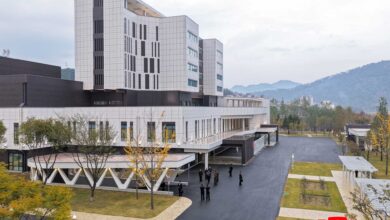On a late autumn day in 1926, when unsearonal snow was falling in large flakes, 14-year-old President Kim Il Sung and Choe Tong O, headmaster of Hwasong Uisuk School, had a serious talk in the latter’s office.
Having heard that of Kim Il Sung’s determination to leave the school in Huadian early and attend middle school in Jilin, the headmaster berated him, saying: “Once you, a man, have resolved to do something, you must see it through. It is not right for you to leave the school early. You say you are leaving because you do not like the education here. Where in this uncertain world is there a school that can be to everybody’s liking?” Then he turned his back on him and stared out of the window at the sky.
Kim Il Sung was also distressed. However, he could not change his decision, which he had reached after going through mental agony for a long time. With the future of the revolution in mind, he had made the decision to move from Huadian into a wider theatre of activity and wage an all-out struggle to realize the programme of the Down-with-Imperialism Union.
After a while, the headmaster broke the silence. His eyes still fixed on the sky, he said: “If this school is not to the liking of such talented students as you, Song Ju, I, too, will leave.” Song Ju was Kim Il Sung’s childhood name.
At these unexpected words, Kim Il Sung stood nonplussed, not knowing what to say. Still, he was convinced that time and events would prove his decision right.
Realizing that he could not make his student change his mind, the headmaster calmed down and said, placing his hand on his shoulder: “I will not oppose any ism, be it nationalism or communism, if it aims at winning the independence of Korea. Anyhow, I wish you success.”
As they went out into the playground together, the headmaster said many fine things to Kim Il Sung, things which would serve as a lesson for him.
Kim Il Sung, too, had many things to say, but he could not speak, such was his mental agony. He was sorry that his headmaster could not understand him.
The conversation between the headmaster and his student stopped unfinished. After he had left the school, Kim Il Sung never regretted his decision. What he did repent of for the rent of his life was his failure to brush the snow off his headmaster’s shoulders.
Having parted from each other in such strained circumstances, their reunion 30 years later was highly emotional.
The headmaster, who had been living in south Korea, came over to the north during the Fatherland Liberation War (June 25, 1950-July 27, 1953) and took up an important position at a state institution. He met Kim Il Sung in the mid-1950s, when the ideals of the Down-with-Imperialism which Kim Il Sung had upheld in Huadian had been put into reality through the defeat of the US and Japanese imperialists.
“So, Premier Song Ju, you were right back then!” the old teacher said to his former student, addressing him by his childhood name.
Thus, with this brief remark, the old teacher concluded the serious conversation that had taken place at Hwasong Uisuk School 30 years previously.

